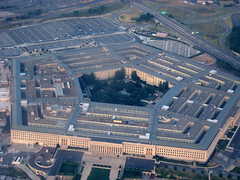Pentagon spending has been a focal point for both President Obama and Governor Romney during the 2012 presidential debates. While Obama’s goal is to slow the defense budget’s growth over the next couple of years, he emphasizes that it will still grow. Romney’s plan however, proposes increasing Pentagon spending to meet 4% of U.S. gross domestic product.
 There's a 48 percent difference between the two plans when looking at the 10-year outcome. Over the next decade, Romney’s plan would lead to a total of $8.4 trillion in Pentagon spending, while President Obama’s calls for a $5.7 trillion total in spending.
There's a 48 percent difference between the two plans when looking at the 10-year outcome. Over the next decade, Romney’s plan would lead to a total of $8.4 trillion in Pentagon spending, while President Obama’s calls for a $5.7 trillion total in spending.
What do the men and women in uniform think about the candidates? Fundraising reports reveal that the armed forces show more support for Obama through campaign contributions. Each candidates strong September fundraising totals among servicemembers resulted in a 22 percent difference in military donations, as Obama brought in $142,197 and Romney $111,015. Despite Romney’s
Romney's plan to increase Pentagon spending by $2 trillion attracted even more scrutiny, though, given the retired Pentagon officals who have joined his "military advisory council." determination to increase the Pentagon budget, he receives less donation support than Obama from active members and employees of the military. Romney has received $87,218 from members of the US Army, his strongest contributor among the branches of the armed forces, this election prior to Aug. 31.
Take a look at the list of Romney’s advisory council, and notice the common positions these retired officials have acquired post-Pentagon. All of these retirees hung up their uniforms, went through the revolving door and went to work for contractors. They have a lot more to gain from military spending than feeling “safe and secure” for the remainder of their retirement. Included in this list is retired General Tommy Franks, who led the invasion of Iraq, and is now running his own disaster consultancy agency.
Photo: Flickr/gregwest98









Be the first to comment
Sign in with